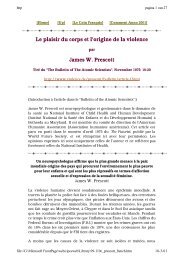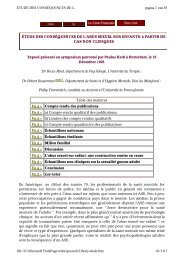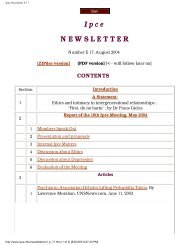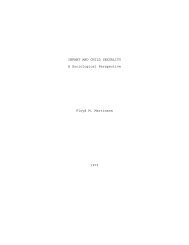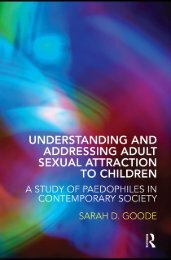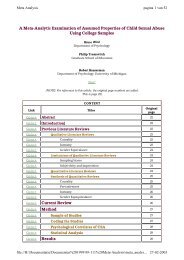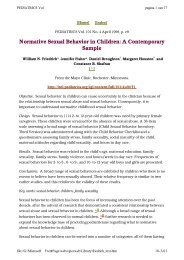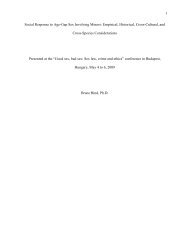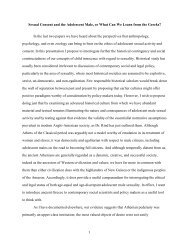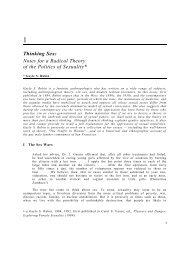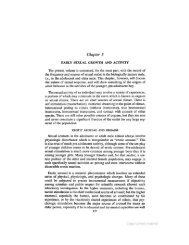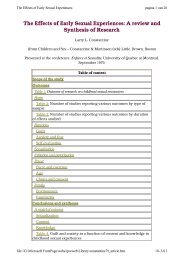PDF file - Ipce
PDF file - Ipce
PDF file - Ipce
You also want an ePaper? Increase the reach of your titles
YUMPU automatically turns print PDFs into web optimized ePapers that Google loves.
Part_5_2<br />
Point (a) seems to me self-evident but point (b) needs explanation. Paul talks about "young<br />
hustlers". Now the word "hustlers" is vague enough to conjure up a variety of possible<br />
scenarios. I don't want to get personal or pin Paul down to anything specific. Paul, you may<br />
wish to comment further in due course, but for the moment I'd like to use the word to make my<br />
own point.<br />
The Four Principles do not, to put it mildly, appear to have been framed with hustling in mind,<br />
however that word might be defined. The ethical vision appears, rather, to be somewhat<br />
blinkered, narrowly confined to settled friendships in which the adult assumes a quasi-parental<br />
sense of responsibility. In my view many kinds of contact - short-term hustler or long-term<br />
friend, or even long-term hustler or short-term friend - can be conducted ethically. However,<br />
the so-called "rules" of ethical conduct will differ significantly according to the circumstances.<br />
The degree of self-determination that it is appropriate for a child to have actually varies greatly,<br />
both with the age, experience and maturity of the child and with the nature of the child's<br />
relationship with the adult. Even in the case of an emotionally rather dependent youngster in a<br />
long-term friendship, however, the desirable principle of self-determination remains, as Paul<br />
pointed out, at odds with wording which appears to indicate a wish to wrap children in cotton<br />
wool, to "protect" them in ways all too characteristic of those who oppose any sexual<br />
expression for children.<br />
Randy's argument about openness<br />
The second excellent IMO posting was from Randy, commenting on Principle 4, on Openness.<br />
He said: "It seems to me that if a child has consciously chosen a relationship with an adult then<br />
they would know that revealing some of the details of that relationship may get one or both of<br />
them in trouble. The mere fact that a child has chosen to ignore the indoctrination against these<br />
relationships indicates that they would willingly keep it a secret if necessary. There is<br />
obviously something about this adult that the child likes. They can derive strength and support<br />
from the adult and his/her friends and not necessarily feel that they were carrying a terrible<br />
burden."<br />
Like Paul, Randy is here exposing an inconsistency: for an adult to decide on the child's behalf,<br />
as a matter of principle, that the child should not engage in an activity that needs to be kept<br />
secret is to impose a limit on that child's self-determination. Note that Randy, quite reasonably,<br />
says youngsters would "not necessarily" feel they were carrying a terrible burden. He is here<br />
acknowledging that in some circumstances secrets would not be a good idea. Once again, it all<br />
depends on particular circumstances and judgments about them. This is half-heartedly<br />
admitted even in the wording of Principle 4, which refers to "unreasonable" secrets, leaving<br />
open the possibility that some such secrets might be acceptable, depending on the<br />
circumstances. The PS, too , is a belated admission that particular circumstances are important.<br />
http://home.wanadoo.nl/ipce/newsletters/nl_e_12/part_5_2.htm (6 of 13) [10/16/2002 5:35:14 PM]



